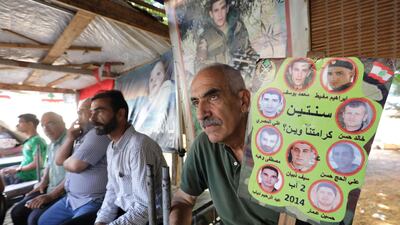As battles against extremist factions rage across the region, the debate on whether it is acceptable for governments to negotiate with terrorists has resurfaced. Suffice to say, that these discussions can rarely be rendered in black and white.
Two days ago, the Lebanese Army announced a pause in its "Dawn of the Barrens" offensive, which set out to clear the Lebanese-Syrian border of ISIL militants. The ceasefire was announced "to give way to the final stage of negotiations on the abducted [Lebanese] soldiers", according to a statement issued by the army. On the same day, the remains of eight Lebanese soldiers held captive by the terrorist group since 2014 were recovered.
In July, Hizbollah led a week-long battle against the group formerly known as Jabhat Al Nusra in the barren plains near Arsal, in northern Lebanon. The campaign ended with the signing of a truce ensuring militants, fighters and several thousand refugees could return to Idlib in Syria. Back then, the Lebanese government was blamed for keeping its army on the sidelines and letting the Iran-backed militia fight a battle on its territory.
______________
Read more from Opinion on Lebanon:
> Editorial: Lebanon's executive power is hijacked by Hizbollah
______________
For years now, the country’s executive power has been seized by Hizbollah. In mid-August, Government ministers from Hizbollah and the Shiite party Amal visited Damascus for a trade fair last month, and though the government dissociated itself from the mission and from the conflict in Syria, such incidents test the country’s cohesion.
The Lebanese public is vehemently opposed to the dealings of Hizbollah. Despite the Lebanese army's insistence that it is not working with either Hizbollah or the Syrian army, their parallel offensive against ISIL on the other side of the border in Syria has led to speculation.
Terrorists are, by definition, individuals society disagrees with, who believe they have the right to kill for a cause that is only legitimate to their eyes. In ISIL’s case, this was accompanied by spreading chaos, ruin and violence in the name of a radical and false ideology.
In Iraq, Turkey was able to gain the release of of over forty diplomats from ISIL, by way of negotiations. Though negotiating with terrorists can be a bargaining tool to end violence or to obtain the liberation of hostages, it is a tactic that can only be used in an extremely circumspect way.
Follow The National's Opinion section on Twitter
_______________
Also view and read
> Shadi Ghanim's cartoon on Lebanon mourns its captive soldiers killed by ISIL
> Lebanese army battling ISIL pays tribute to victims in Spain

